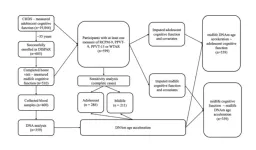(Press-News.org) The University of California San Diego has been selected for the third time to participate in the Geriatrics Workforce Enhancement Program (GWEP). This highly selective program comes with a $5 million grant from the Health Resources and Services Administration (HRSA). These funds will be used over the next five years to support the San Diego Imperial Geriatric Education Center (SDIGEC), which provides geriatric educational programming to health workers and other care providers across both San Diego and Imperial counties.
SDIGEC is an ongoing collaboration between UC San Diego and San Diego State University (SDSU) that works to address the critical need for more aging-friendly communities and health systems. Since its genesis in 2015, SDIGEC has been housed at SDSU, but the new funding will relocate the center to UC San Diego. The grant will also support new programming to reach underserved communities and provide training for a wider variety of health workers and caregivers, emphasizing the needs of those living with Alzheimer’s disease and related dementias.
“As our aging population continues to grow and diversify, care needs will continue to evolve, so our workforce must evolve in turn,” said Roopali Gupta, M.D., clinical professor in the Division of Geriatrics, Gerontology and Palliative Care at UC San Diego School of Medicine and SDIGEC project director. “Over the next five years, SDIGEC will work to reach a broad range of learners across multiple health care professions through training and education with the ultimate goal of providing the best care possible for older adults in our communities.”
This year, 41 institutions were selected for GWEP funding across the U.S. Only two of these, UC San Diego and Azusa Pacific University, are located in California.
“One of the beautiful things about the GWEP program is that in addition to continuing our work locally, we get to join a national community of organizations with a shared mission, and we are honored to be invited into that community,” said Jennifer Reichstadt, SDIGEC project manager and director of education and development for the Division of Geriatrics, Gerontology and Palliative Care. “Working together to address these issues at the national level gives us a tremendous opportunity to improve older adult care for the wider community, and it’s wonderful that UC San Diego was selected to help meet that goal.”
With the new funding, the center will focus on providing interprofessional geriatrics clinical training and education to current and prospective health care professionals, including nurse practitioners, master’s in social work students, medical students, resident physicians, fellows, as well as providers and preceptors in tribal, tribal organizations, underserved, and/or rural (TTOUR) primary care sites and delivery systems, including nursing homes. The program will also prioritize community outreach and education for caregivers, recognizing the critical role they play in supporting older adults.
“By tailoring knowledge and training to the specific needs of underserved communities, we hope to address the significant disparities in health care that exist for these populations,” said Gupta. “In addition to improving health care itself, engaging closely with the many diverse groups living across these two large counties can help us make the entire community, not just health care facilities, better equipped to accommodate the needs of aging people and those living with Alzheimer’s disease and related dementias.”
END
UC San Diego receives $5 million to support geriatrics workforce enhancement program
New programs to focus on engaging underserved communities and creating more aging-friendly health systems
2024-06-25
ELSE PRESS RELEASES FROM THIS DATE:
Got prunes? Prunes may preserve bone density and strength in older women
2024-06-25
UNIVERSITY PARK, Pa. — Dairy isn’t the only food that’s good for bone health. Prunes may also protect bone structure and strength in postmenopausal women, according to a new study led by Penn State researchers. The findings, published in Osteoporosis International, suggest that daily prune consumption slows the progression of age-related bone loss and reduces the risk of fracture.
“This is the first randomized controlled trial to look at three-dimensional bone outcomes with respect to bone structure, geometry and estimated strength,” said Mary Jane ...
Associations of childhood, adolescence, and midlife cognitive function with DNA methylation age acceleration in midlife
2024-06-25
“[...] our study brings attention to the potential influence of adolescent crystalized intelligence on age-related DNAm at older age.”
BUFFALO, NY- June 25, 2024 – A new research paper was published in Aging (listed by MEDLINE/PubMed as "Aging (Albany NY)" and "Aging-US" by Web of Science) Volume 16, Issue 11, entitled, “Associations of childhood, adolescence, and midlife cognitive function with DNA methylation age acceleration in midlife.”
Prior studies showed increased age acceleration (AgeAccel) is associated with worse cognitive function among ...
Think you might have COVID? Wait two days to test
2024-06-25
Peek in medicine cabinets across the U.S. and you’ll find stacks of leftover COVID-19 tests.
When symptoms arise, so do questions: When should I test? How accurate is it really? And what should I do if I test positive?
In a paper published June 14 in the journal Science Advances, CU Boulder researchers unveil a new mathematical model to quickly answer such questions, not only for COVID but also for emerging rapid tests for respiratory syncytial virus (RSV), the flu and other infectious diseases.
One key takeaway: Advice can differ ...
Researchers develop new training technique that aims to make AI systems less socially biased
2024-06-25
CORVALLIS, Ore. – An Oregon State University doctoral student and researchers at Adobe have created a new, cost-effective training technique for artificial intelligence systems that aims to make them less socially biased.
Eric Slyman of the OSU College of Engineering and the Adobe researchers call the novel method FairDeDup, an abbreviation for fair deduplication. Deduplication means removing redundant information from the data used to train AI systems, which lowers the high computing costs of the training.
Datasets gleaned from the internet often contain biases present in society, the researchers said. When those biases are codified in trained AI models, they can serve to perpetuate ...
Backward walking speed reserve assessment offers improved clinical screening for risks and decline in MS patients
2024-06-25
DETROIT — Wayne State University postdoctoral research fellows Patrick Monaghan, Ph.D., and Michael VanNostrand, Ph.D., along with Nora E. Fritz, Ph.D., PT, DPT, NCS, director of the Neuroimaging and Neurorehabilitation Lab and associate professor of physical therapy in the Department of Health Care Sciences in WSU’s Eugene Applebaum College of Pharmacy and Health Sciences, recently published a study on mobility assessments in the journal, Multiple Sclerosis and Related Disorders.
The study, “Backwards walking speed reserve in persons ...
Clinical trial evaluates economic impact of changing how healthcare is delivered to older people in the emergency department
2024-06-25
The evaluation of the OPTI-MEND trial demonstrates that investing in an additional dedicated professional team to the already existing ED care increases patients’ quality of life and will save, on average per person, a staggering €6,128.
Crowding in emergency departments (EDs) is a growing problem in Ireland and internationally and, coupled with long waiting times, affects healthcare outcomes and patient satisfaction. A new study from researchers at Trinity College Dublin and University of Limerick examined the economic impact of adding a specific, appropriate, and dedicated team of professionals to the care already available ...
Uncovering the drivers of a million-year-old glacial transition
2024-06-25
The climate modeling community has been particularly vexed by the glacial/interglacial cycles of the past three million years, when the Northern Hemisphere oscillated between times with and without large ice sheets.
From about 1.25 million to 750,000 years ago—in the Pleistocene epoch—a change in glacial cycles called the Mid-Pleistocene Transition (MPT) occurred. During this time, glacial/interglacial cycles shifted from occurring every 41,000 years to every 100,000 years, with an increase in the amplitude and asymmetry of the cycles. Scientists are working to understand why these changes happened, considering that insolation forcing—variation ...
Surprising vortex behind new solar cell and lighting materials
2024-06-25
Metal-halide perovskites have quickly advanced in the last decade since their discovery as a semiconductor that outshines silicon in its conversion of light into electric current.
Simulations on TACC's Frontera and Lonestar6 supercomputers have revealed surprising vortex structures in quasiparticles of electrons and atoms, called polarons, which contribute to generating electricity from sunlight.
This new discovery can help scientists develop new solar cells and LED lighting. This type of lighting is hailed as eco-friendly, sustainable technology ...
Should you eat more dietary fiber? New study says it depends.
2024-06-25
ITHACA, N.Y. -- Nutritionists generally advise everyone to eat more dietary fiber, but a new Cornell University study suggests that its effects on health can vary from person to person. The findings indicate that recommendations should be tailored to each individual’s gut microbiome.
The study, published in Gut Microbes, focused on resistant starch, a category of dietary fiber found in such foods as bread, cereals, green bananas, whole-grain pasta, brown rice and potatoes.
The researchers identified ...
Researchers evaluate the benefit of dual therapy for children at risk for spinal muscular atrophy
2024-06-25
In a first-of-its-kind study, researchers compared the efficacy of preventative therapy for spinal muscular atrophy (SMA) between two well-matched study groups, using either gene therapy (onasemnogene abeparvovec) alone or in combination with risdiplam (oral medication) or nusinersen (intrathecal injection) administered before apparent signs of disease emerged. The study included presymptomatic infants with two or three copies of SMN2 at risk for developing SMA type 1 or 2, respectively. SMA is a devastating ...
LAST 30 PRESS RELEASES:
New study identifies growth hormone receptor as possible target to improve lung cancer treatment
Routine helps children adjust to school, but harsh parenting may undo benefits
IEEE honors Pitt’s Fang Peng with medal in power engineering
SwRI and the NPSS Consortium release new version of NPSS® software with improved functionality
Study identifies molecular cause of taste loss after COVID
Accounting for soil saturation enhances atmospheric river flood warnings
The research that got sick veterans treatment
Study finds that on-demand wage access boosts savings and financial engagement for low-wage workers
Antarctica has lost 10 times the size of Greater Los Angeles in ice over 30 years
Scared of spiders? The real horror story is a world without them
New study moves nanomedicine one step closer to better and safer drug delivery
Illinois team tests the costs, benefits of agrivoltaics across the Midwest
Highly stable self-rectifying memristor arrays: Enabling reliable neuromorphic computing via multi-state regulation
Composite superionic electrolytes for pressure-less solid-state batteries achieved by continuously perpendicularly aligned 2D pathways
Exploring why some people may prefer alcohol over other rewards
How expectations about artificial sweeteners may affect their taste
Ultrasound AI receives FDA De Novo clearance for delivery date AI technology
Amino acid residue-driven nanoparticle targeting of protein cavities beyond size complementarity
New AI algorithm enables scientific monitoring of "blue tears"
Insufficient sleep among US adolescents across behavioral risk groups
Long COVID and recovery among US adults
Trends in poverty and birth outcomes in the US
Heterogeneity of treatment effects of GLP-1 RAs for weight loss in adults
Within-person association between daily screen use and sleep in youth
Low-dose lithium for mild cognitive impairment
Catheter ablation and oral anticoagulation for secondary stroke prevention in atrial fibrillation
A new theory of brain development
Pilot clinical trial suggests low dose lithium may slow verbal memory decline
Bioprinting muscle that knows how to align its cells just as in the human body
A hair-thin fiber can read the chemistry of a single drop of body fluid
[Press-News.org] UC San Diego receives $5 million to support geriatrics workforce enhancement programNew programs to focus on engaging underserved communities and creating more aging-friendly health systems



